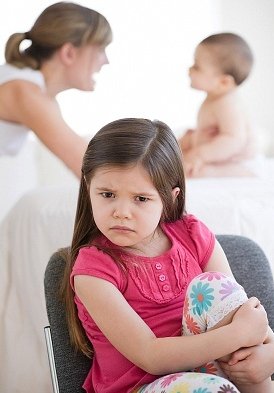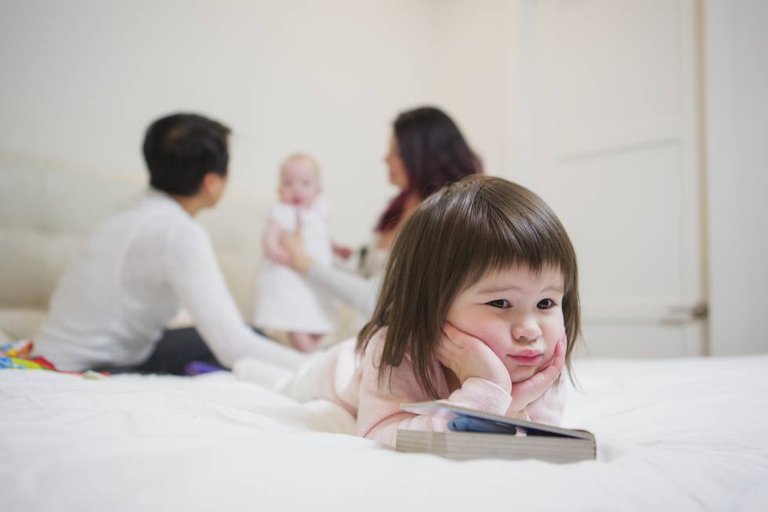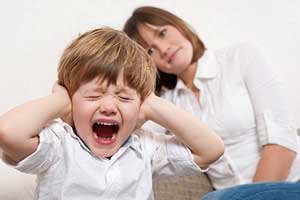When the first child arrives at a home to cheer it up, everyone is in charge of pampering it and giving it a privileged place, as much as if it were a prince. But when a new child arrives the eldest son feels that his place is occupied by an intruder, to whom they pay attention and affections that were once his, this is called jealousy of brothers or the syndrome of the dethroned prince.

1
When the child feels that they no longer want him, he can begin to behave in an inadequate way, since he thinks that in this way he will be able to pay attention again. It is important that parents adopt strategies to counteract the effect on their family of this syndrome and that there are no permanent rivalries.
Infantile jealousy is a natural feeling that arises in the child when he feels displaced.
They consist of feeling hatred and rejection towards people who are loved very much. The fact that it is a contradictory feeling is what hinders its management.

2
Therefore, it is important to be aware that it is natural and logical for jealousy to appear. It is a process of adaptation and maturation in the normal evolution of children. Through these, the child is trying to express that he perceives that change and that he is afraid of being displaced, of losing prominence and the exclusive attentions of those he had been enjoying so far. For this reason, it is very important to know how to handle this jealousy properly.
A child can express that he is jealous through various behaviors: complaints, physical discomforts (belly pain, vomiting, ...), enuresis, easy crying for no apparent reason, extreme sensitivity, refusal to do what is asked, use of another language infantile, due to its evolutionary stage, decreased appetite, refusal to eat or sleep only when up to now it did so without problem, express fears, constantly request the attention of the parents during the night, be restless or uneasy, use of aggression towards parents, etc.

3
Children are born absolutely dependent on an adult who cares for them and takes care of their upbringing. This dependence is physical but also affective. They need constant support in their first years of life. When some circumstance reduces the time, the affection or the dedication that the parents offer to a son, jealousy arises. The child feels that he has to compete to win the love that until then had been granted unconditionally.
How do children's jealousy manifest?
Child jealousy is sometimes manifested through aggressive behaviors: hitting, biting, pinching, hitting the opponent or parents. That is, jealous behaviors can manifest towards the brother, the new partner, etc. or towards the main attachment figures.
On other occasions, they are manifested through behaviors that draw the attention of parents. The child may not hit or bite, but he is constantly talking loudly, bumping to make noise, doing things he knows they do not like, that will provoke his parents' anger and, at the same time, get his attention.

4
At what age do children's jealousies appear?
Infantile jealousy can appear at any age during childhood, but its manifestation is different.
• When the child is very young, less than two years old, these manifestations go unnoticed, since children who fear losing their parents' love can manifest it by showing themselves totally submissive, obedient, loving in excess ... anything to make their dads do not abandon them.
• As they grow, children's jealousy manifests more clearly through aggressive and disruptive behavior, abrupt. And after 5 or 6 years, children have reached a level of cognitive development sufficient to manipulate emotionally, almost as an adult would do: withdrawing affection from those for whom they feel abandoned, for example.
What to do in the face of our son's jealousy?
First, try to understand what is causing them.
There are very clear and evident moments as occurs before the birth of a brother. In others, jealousy is a reaction understandable but not expected.
And, no doubt, when jealousy appears, there is some element that triggers it.
Most parents know what makes our children jealous. Simply understanding it changes our attitude to his jealousy.
To a certain extent, we can put ourselves in their place and understand that jealousy is nothing more than a manifestation of something that makes them feel helpless and vulnerable.
Let the child express what he feels, in an appropriate way, that is not harmful to him or others.
When we see that he shows jealousy, we can approach our son and tell him that we understand how he feels, but that he can not hit others or himself.
If it really feels so bad, we will recommend that you look for other ways to express it. For example, asking us for love or contact to us, using toys or harmless objects that help you to unload your anxiety: cushions, balls or performing behaviors that allow you to relax: do cartwheels or run in suitable places for it.
Be alert to possible situations that trigger jealous behavior.
In a preventive way, we can be alert to possible moments of the appearance of jealousy.
In these cases, if we know that the situation will trigger the child's jealousy we can prevent it by talking to him, preparing him to face what is coming or looking for compensation. "We will spend a little time together, later or another day".
It is important to avoid making material compensations because what children miss in these occasions is our company and attention, not the fact of having a toy or a gift.
Jealousy of the child when a baby arrives
Fraternal jealousy is one of the most judgmental feelings in the child but, if they focus well, can promote the emotional development of the child.


Reference:
http://www.hacerfamilia.com/familia/noticia-familia-frente-celos-hermanos-20150618120024.html
http://www.crecerfeliz.es/Ninos/Desarrollo-y-aprendizaje/Celos-entre-hermanos
https://www.serpadres.es/3-6-anos/educacion-desarrollo/articulo/celos-entre-hermanos
https://www.elbebe.com/ninos/consejos-para-tratar-celos-infantiles
https://www.guiainfantil.com/articulos/educacion/celos/que-es-el-sindrome-del-principe-destronado/